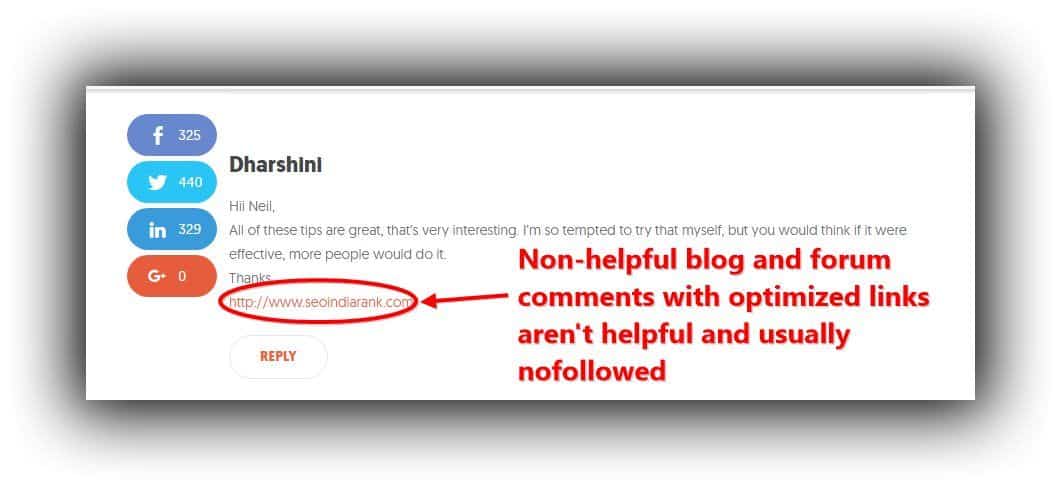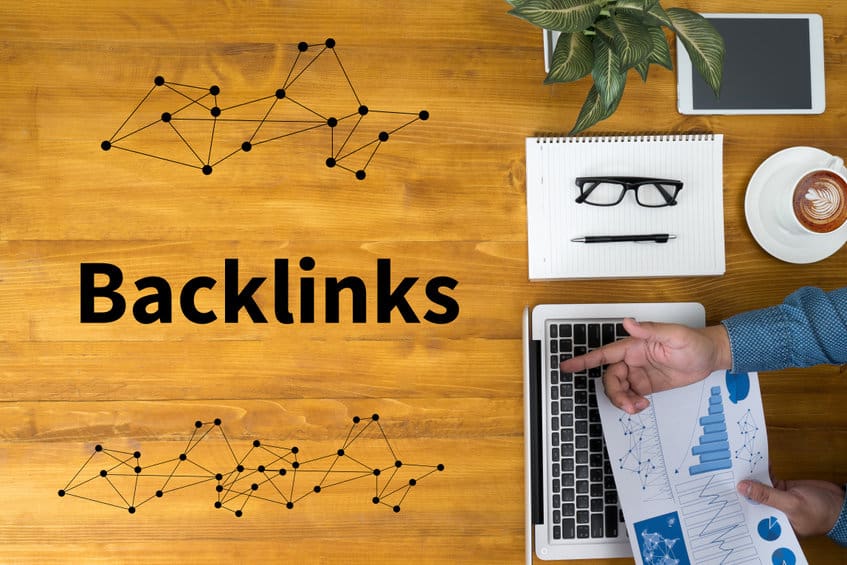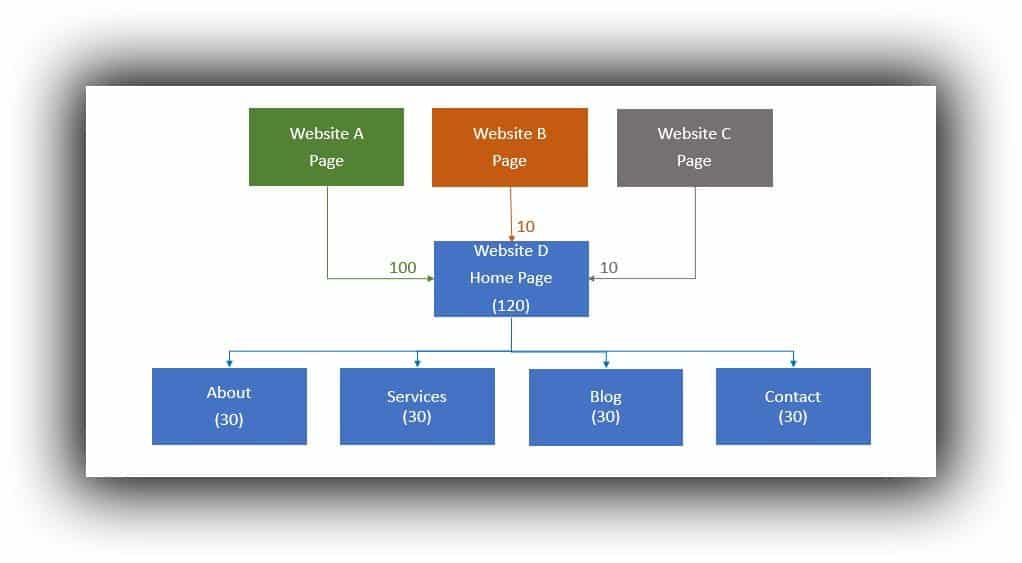Estimated Read Time: 9 Minutes
Links, Backlinks, and SEO Backlinks
A link is an online reference to content you can access with the click of a mouse. A link will take you to another spot within a page or to an entirely different page or website altogether.
A backlink is an incoming link from an external source – a website other than your own.
A search engine optimization (SEO) backlink is the same. The “SEO” in front merely indicates the fact that links have the potential to influence your search engine rankings. That influence can be good, bad, positive, negative, or neutral depending on factors discussed below.
Links Are Important
Links are important because they:
- make it possible for Google to discover and index your content, and
- are a major consideration when Google ranks search results.
Google can’t rank your content in search results unless they are first aware of it. Links are a search engine’s pathway to discovering content. Search engines use software called crawlers or bots to “crawl” the Internet and travel from one piece of content to another via links. Discovered content is placed into a giant inventory or index of all the content they have been able to find on the Web. That index is the main input to search engine ranking algorithms – the software search engines use to decide who ranks where in search results.

If your content isn’t in Google’s index, you won’t show up in search results.
Links, Relevance, and Ranking
Once you’re in the index, you’re then eligible to be ranked. Google has said it uses over 200 criteria with over 500 variations each to decide who ranks where in search results. This is where links and relevance come in.
Relevance is the most important ranking factor, meaning your content has to be something the searcher is hoping to find before it will even be considered for ranking. For example, if a searcher types “vegetarian pizza near me” into Google, links won’t help your auto repair shop rank any higher in search results because it’s not likely to be of use to the searcher, it’s irrelevant.
If your content is relevant, then links become important. Links are the currency of the Internet. They work much like your reputation does in real life. If someone recommends your business to a peer, friend, or family member, he or she is casting a vote or endorsement for your goods and/or services. Links work the same way. A link is a vote or endorsement for your content.
A link signals content popularity to Google. All things being equal, the more, and more relevant “votes” or links your content earns, the higher it will rank in search results.
Not All Links Are Created Equal
But all things aren’t created equal.
As previously suggested, links coming from related and reputable sources have the most value when it comes to helping your content rank higher in search results. How does Google decide which links come from valuable and reputable sources? The answer is somewhat circular, meaning Google uses links to decide which links are more valuable than others. I’ll explain more below.

Similar to the difference between getting a recommendation or endorsement for a doctor from a doctor or close family member versus getting a recommendation from a random person on the street, a link coming from an authoritative or related source has more trust and greater value. An authoritative source is a very well-known and high-quality website that has earned the trust and respect of its peers and audience. Authority websites tend to publish large quantities of comprehensive, detailed, accurate, and verifiable information and then link out to other websites that do the same. Visitors trust the content on authoritative websites and willingly advocate on their behalf by linking to them freely and sharing their content on social media channels.
Examples of authoritative websites include common, everyday names like Apple, Amazon, Harvard University, Facebook, Forbes, Microsoft, NASA, The Mayo Clinic, Wikipedia, and Youtube. These are all examples of trusted websites that have been around for years and earned millions, if not billions, of backlinks.
So links have to be relevant, and the higher the quality of the link, the more it will help your rankings.
How Links Help Your Rankings
Think of the Internet as one big network of web pages interconnected by links. As one piece of content ages and more and more people discover, link to, and share it, it earns and acquires more and more trust, authority, and yes, backlinks. These things, combined with relevance, determine your overall ranking potential.
Authoritative websites have excellent reputations and have accumulated more backlinks than most because people trust their content and tend to link to them more than others. Links from these sources have more value because you become part of their “web of trust” and inherit some of their trust, reputation, and link equity.

Web of Trust from Wikimedia Commons
Link Equity or Link Juice*
A backlink from an authoritative website passes more link equity because it has more incomings links and more link value to share with others. Link equity (link juice) is a reference to the amount of ranking potential that gets transferred from one website to another when two pages are linked.
The illustration below shows how link equity flows from one website to another.
Website D’s Home page (in the middle of the diagram) has accumulated SEO equity of 120 “votes”. 100 of those votes come from a single backlink on an authoritative website, Website A.
Websites B and C each also contribute 10 votes each to D’s overall SEO equity. Their sites are less reputable so their links pass less equity.
Link equity flows within a website as well as across different domains. In this same example, you can see that Website D’s SEO equity gets redistributed to the internal pages that are linked to from its Home page. The About, Services, Blog, and Contact pages each receive one-quarter of the Home page’s total SEO equity or 30 points per page.
*A word of warning about “link juice”. Google is not keen on the term and warns individuals to avoid SEOs who put any sort of value on the concept. In my mind, it’s semantics. The concept of websites being able to transfer authority is still valid and important to understand. Don’t believe me? Here’s another opinion.
Low-Quality Links
Links from low-quality websites do not help your rankings. At best, they have little to no impact whatsoever. At worst, they harm your rankings. So what qualifies as a low-quality link?
Google publishes quality guidelines that define low-quality links or “link schemes” as links intended to manipulate a site’s ranking in Google search results. Examples include:
- buying and selling backlinks;
- excessive link exchanges or partner pages exclusively for the sake of cross-linking;
- large-scale article marketing or guest posting campaigns with keyword-rich anchor text links; and
- using automated programs or services to create links to your site.
Google also considers links that were not editorially placed as low-value or bad. Common examples of non-editorially placed links include widely distributed site-wide footer and template links, links from poor quality directory sites (that accept anything), affiliate links (where you are compensated for an endorsement), and non-helpful blog and forum comments placed just as a way to stuff a backlink onto someone else’s website.
These types of links, used in bulk, can result in a site-wide or page penalty, a warning, and/or the loss of rankings.
NoFollow Links
Website owners can control the flow of outgoing link juice using link attributes. Link attributes include things like the link title, destination, and anchor text (the clickable words that appear on the page).
The nofollow link attribute prevents link juice from flowing to the destination page. The juice from that link is not just redistributed to other links on the page, it is dropped. So using nofollow links to help your audience and hoard your link juice doesn’t help your rankings either. As I said, that equity is simply dropped.
This is an example of a Contact Us page that uses a nofollow link in its code.  I’ll break it down for you.
I’ll break it down for you.
- paired with specifies the start and end of the link.
- href is the first attribute. It indicates the link destination.
- rel=”nofollow” tells search engines you do not want to pass SEO equity to the link destination.
- The word or words appearing after that and between close bracket (>) and the end of the link () are the words on the page you want to be clickable.
Google recommends using the nofollow tag in instances where you might be encroaching upon their guidelines or when you want to publish content without endorsing it. Most blog and forum owners, for example, apply the nofollow attribute to links in their comment moderation systems. This discourages visitors from leaving useless remarks paired with self-serving backlinks in their blog comments.
The Rules Aren’t Always Clear
There are a lot of instances where Google Guidelines aren’t always clear. Nofollow links give you one option for dealing with them and possibly avoiding a problem in the future. The other, perhaps more obvious option, is to not waste time trying to acquire low-value links in the first place.
I hope this has helped answer some of your questions about SEO backlinks and how to assess link quality. If you still have questions, please note them in the comment section below and I will get back to you. Thanks for reading!






This is one of the clearest explanations of backlinks I’ve come across really appreciate the examples and breakdown of link equity
Thanks for the compliment. I appreciate it, especially since you’ve built a tool to research backlinks.